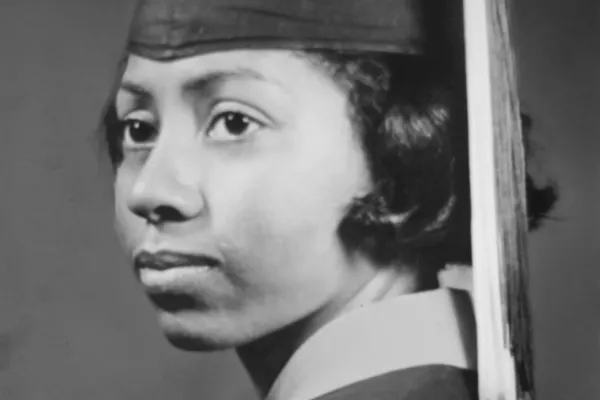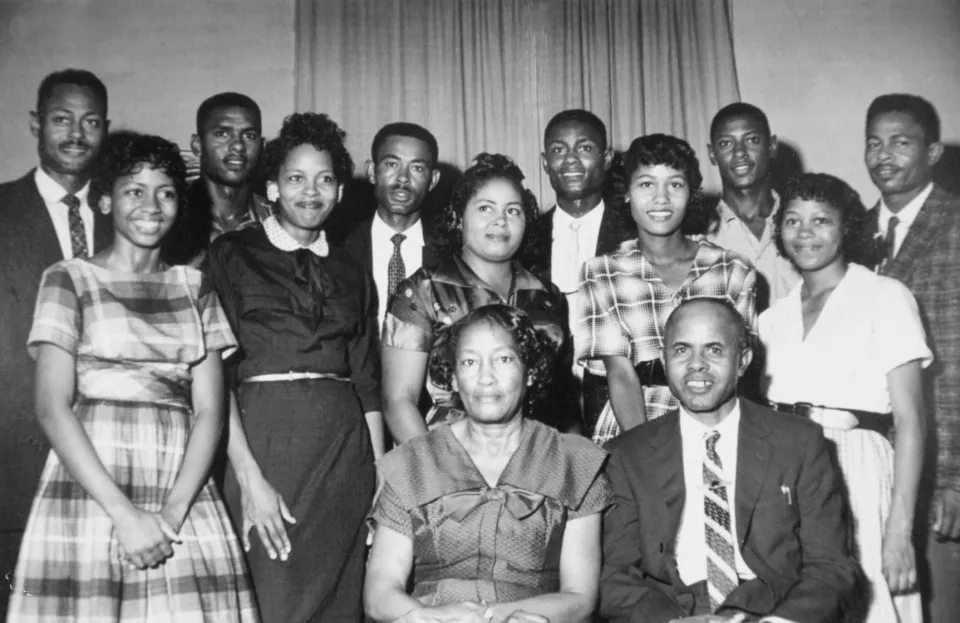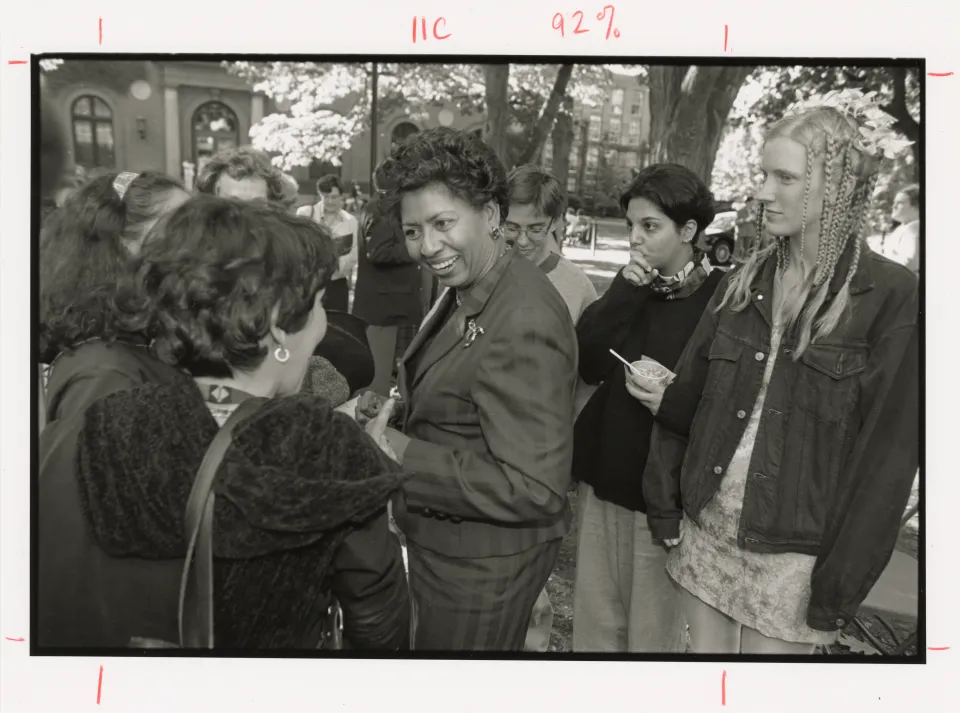A New World of Mystery and Magic
News of Note
In 1951, former Smith President Ruth J. Simmons’ family moved to Latexo, Texas, where 6-year-old Ruth met a teacher, Miss Ida Mae, who would change the course of her life.
Published December 19, 2023
Chapter 5: Miss Ida Mae
While our family lived on the Murray Farm, most of my older siblings could attend school only when no work was required on the farm. That fate would have befallen me as well if we had remained there. School absenteeism, a commonplace among farm families in that era, left large gaps in children’s preparation, hobbling their educational progress until they could escape the demand for child
labor. Often they had to overcome that deprivation in adult life by seeking high school equivalency certification. My parents had little concern about children missing school because, in our busy household, hard labor was valued above all competing activities. Reading, reflection, or any type of mind work was superfluous and irresponsible by comparison. Sedentary tasks, deemed suspect, often elicited complaints of laziness or good-for-nothingness. Even after the sun set and no fieldwork occurred, other activities weren’t allowed because we could not squander the kerosene in the lamps.
In the fall of 1951, our move to Latexo enabled me to take a school bus every day to W. R. Banks School in Grapeland. Rapidly and with welcome intensity, my world opened up. At the age of six, I was introduced to the powerful world of learning by a dedicated, gifted teacher—Miss Ida Mae Henderson. Although I had had no introduction to formal learning, I recall no apprehension when I started school. I walked into my first classroom with thick, unstraightened plaits; large, bulging eyes; a homemade, ill-fitting dress; and the odor of the bacon fat my mother had smeared on my legs to treat my ashy skin. Although I must have been a sight, instead of making me feel homely, different, and unwelcome, Miss Ida Mae made me think that I was the princess of W. R. Banks—equal to or better than any other child in her class.
Accustomed to my family calling me “you ole big-eyed girl!” I found it remarkable that this woman greeted me with “Hello, precious!” or “Good morning, baby!” By telling me I was valued and speaking to me in this way, she invited me into a world of mystery and magic. What would I discover in such a place? Perhaps the key to the realm that I had long imagined, one varied and interesting, where I would be equal to others.
A buxom woman of thirty-four, Miss Ida Mae was unremarkable in personal appearance. Her glasses lent her an air of seriousness in my eyes because I had not known many who could afford eyewear. Comparatively well-off, educated Black women of a similar age often created a fashionable identity for themselves. After all, only a handful of Blacks in Grapeland had the distinction of being college educated. But utility was Miss Ida Mae’s guiding principle in all matters. Wearing clothes that were clean, pressed, and presentable; keeping her hair sensibly straightened and styled; and wearing ordinary glasses, she more than made up for the plainness of her appearance. Her focus was on the children and the magic she created for them in her classroom.
Simmons’ family in 1957 in Houston. Simmons is at far left in the middle row. Courtesy of Ruth J. Simmons
The classroom was itself a place of brilliant light unlike any our homes afforded. Every desk and chair was in order, and all educational materials had their proper place. In my eyes, the order of the room suggested the significance of its activities. Most of all, unlike the sounds of work in the fields, the sounds that emanated from Miss Ida Mae’s palace were cheerful, even in the midst of intense activity. It was in Miss Ida Mae’s classroom that I first felt my personal importance. It was there that I experienced for the first time ownership of a space and utensils designated for my use alone. A desk and chair, books, paper, and pencils may seem little to many. Yet, for me, coming from a people-crowded but sparsely furnished home, where it wasn’t even possible for everyone to be seated at the same time, having a place of my own was miraculous. I began to appreciate that the use and development of my mind might be as important as the physical labor my parents more often praised. That discovery would have a profound effect on my life.
Everything seemed possible with Miss Ida Mae. She could do all the things that I wishedMama had time to do: answer my incessant questions about x and y, give me stimulating work, be patient with me, and teach me how to do many things. Her voice was full of light—ever cheerful and controlled. Her graceful gestures and manner of speaking seemed calculated to capture the energy and deepest meaning of whatever she sought to convey. When she was surprised or delighted, her voice soared; when she was calming a disappointed child, her voice deepened to a reassuring hush. Most of all, her enthusiasm for her work and for the individual students seemed genuine.
When she turned her attention to me, I felt that Miss Ida Mae saw me as a great discovery. Approaching me with a smile, she would bend over my work and express admiration for how well I had done. Everything I did in completing an assignment seemed to prompt extravagant praise. I looked forward to her evaluations of my progress and pressed myself to do my work thoroughly. I even tried to imitate the precision and musicality of her voice; the mumblings of farm culture began to fade from my speech even at that young age. I could not understand how such a magnificent person could heap praise on me, an ugly country girl!
“I began to appreciate that the use of my mind was as important as the physical labor my parents praised.”
Perhaps Miss Ida Mae’s praise was so important to me because it was the first that I recall receiving as a child. Her words made me feel like a unique person rather than an appendage to my large family. I don’t recall the specific tasks she assigned, but when she needed a child to do something, she often called on me. Her invitations to me to perform tasks like moving small objects and reading aloud in front of the class allowed me to imagine that sharecropping limitations would not forever define me. The more excitement she expressed about whatever I was doing, the harder I tried and the more I wanted to achieve.
Miss Ida Mae knew just what to do for the country children who came to her room. With the exception of Baby Brother, I made no friends among the children in my class. They were an obedient and calm group, absorbing Miss Ida Mae’s urgings without noticeable reactions. Didn’t they understand how privileged they were to be in her presence? Without a hint of ridicule, she insisted that we could all do the reading and math she placed before us. What an empowering way to introduce children to learning. In my very first encounter with formal education, Miss Ida Mae’s enthusiasm convinced me that learning was supremely important, thoroughly enjoyable, and immensely expansive.
Until that year, everybody I knew was an uneducated farmer or laborer who spoke or read with difficulty. To be in the presence of a person who spoke so well was a revelation. I wanted to seize control of these words and make them work for me. I was accustomed to the Black dialect of my family and peers, in which words were truncated, elided, mispronounced. Miss Ida Mae’s enunciation made words seem important. It was not “Grapelin” but “Grapeland”; not “chilren” but “children”; not “Rujean” but “Ruth Jean.” With her help, I began to speak with deliberate attention to pronouncing final consonants and all the syllables of words. Fascinated with the precision afforded by mysterious multisyllabic words, I began memorizing some that Miss Ida Mae used. I collected words as some children my age collected dolls, stamps, or baseball cards; this pursuit was not merely empowering, it was as if I was inheriting a fortune.
Simmons greets well-wishers at her 1995 inauguration as Smith’s ninth president. Photo by Jim Gipe
Shortly after I became president of Smith College, I visited Grapeland. To the great surprise of my siblings, one of the prominent white churches there had invited me to speak at a special program held in my honor. Whatever honors I had received up to that time, this invitation was a great triumph to my siblings because when we lived in Grapeland, this very church, and so many others like it across the country, had forbidden Blacks to attend. Miss Ida Mae, then well into her eighties, came to hear my speech and attend the reception afterward. “I’m so happy to see my baby!” she sang out as if I were still a six-year-old. Tearfully embracing her, I was overwhelmed to see this woman who had set me on the path to a career in education. She had introduced me to the simple premise that the life and exercise of the mind bestow enormous power and promise. She provided a beacon that guided me toward achievement through education.
Seeing her after so many years as a student, professor, and administrator, I could understand better why she had such an impact on my life. She was the incarnation of all that it means to be a teacher, a mentor, a guide. Ever hopeful about what human beings can achieve through learning, she was still inspiring young people even though she had retired. Beyond her sweet greeting, she did not say much to me that day. But it struck me more than ever how much her attitude and commitment to her students had influenced my views about education and my attitude toward my own students. I had wanted her to attend my inauguration at Smith, but she was not able to travel. A September 27, 1995, article in The New York Times about my appointment at Smith College mentioned that she could not attend but that I had cited her as a teacher who was supremely important in my development. I hoped that she had been pleased with that article. After seeing her again, I returned to Smith determined to be a light to my students not just while they were at Smith but for the rest of their lives.
I had come from a family in which girls were implicitly expected to be less important, allowing the boys to receive most of the attention. Mama, an old-fashioned wife, taking orders from Daddy and never daring to have any independent ambition outside of the kitchen, was the antithesis of Miss Ida Mae. This educator made me aware that there were women who had jobs, responsibilities, and professions. I must have recognized in Miss Ida Mae a spirit that not only made ambition possible but opened up the world beyond my clan, my community, and my race, and encouraged me to take a more generous stance toward the world.
Racism had reduced my father to a shadow of the man he could have been, and he turned the demeaning arrogance that had victimized him on my mother, making her subservient to him in every way. With Miss Ida Mae, for the first time I saw the kind of independence of spirit that made life free, happy, and meaningful. If learning could lead to such a result, I wanted it to be a part of my life forever.
From the book Up Home: One Girl’s Journey by Ruth J. Simmons. Copyright 2023 by Ruth J. Simmons. Published by Random House, an imprint and division of Penguin Random House LLC


